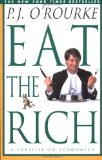Summary | Excerpt | Reviews | Readalikes | Genres & Themes | Author Bio

Critics' Opinion:
Readers' Opinion:
First Published:
Sep 1998, 240 pages
Paperback:
Sep 1999, 255 pages
I had no interest in economics at college, either. I belonged to that great
tradition of academic bohemia which stretches from the fifteenth-century riots
of Francois Villon's to the Phish tours of the present day. For university
hipsters, there is (no doubt Villon mentions this in his Petit Testament)
nothing more pathetic than taking business courses.
My friends and I were above that. In our classes we studied literature,
anthropology, and how to make ceramics. We were seeking, questing, growing.
Specifically, we were growing sideburns and leg hair, according to gender. It
did not occur to us that the frat-pack dolts and Tri-Delt tweeties, hurrying to
get to Econ 101 on time (in their square fashion), were the real intellectuals.
We never realized that grappling with the concept of aggregate supply and demand
was more challenging than writing a paper about "The Effects of Cool Jazz
on the Poetry of Edgar Allan Poe." What the L-7's were being quizzed on was
not only harder to understand than Margaret Mead's theories about necking in
Samoa, it was also more important. The engine of existence is fueled by just a
few things. Unglazed pottery is not among them.
If the Rah-Rah Bobs and Pin-Me Sallys had been taking Love or Death courses,
we would have been right there with them. But money was a different matter. We
weren't interested in money. Actually--what we weren't interested in was work.
Maybe we guessed that it would be a lot of work to b.s. our way out of
memorizing such formulae as:
% Change in Supply
Price Elasticity = ------------------
% Change in Price
Not that we weren't up to the task: "Like, price--that equals wasting
natural resources and the pollution thing, if you're into the whole capitalist,
monopoly rip-off, man."
And, of course, we were interested in money. I remember we'd get
excited whenever we had any. It's just that we were determined not to earn it.
We would never go in search of money. Money was something that would come
looking for us after we'd choreographed our world-shattering modern-dance
recital or mounted our famous empty-gallery show of preconceptual
post-objectivist paintings or when our folk-rock group, Exiles of Dayton,
learned to play "Kum Ba Ya." And we weren't going to "sell
out" no matter how much money was lavished upon us.
Business majors intended to (it was a loaded phrase in those days) "make
money," and they were going to do this even if it involved some activity
that wasn't a bit artistic, such as running IBM. We artsy types would have been
shocked if anyone had told us (and no one had the nerve) that making money was
creative. And we would have been truly shocked to learn that a fundamental
principle of economics--"Wealth is created when assets are moved from
lower- to higher-valued uses"--is the root of all creativity, be it artsy,
IBMsy, or whatever.
"Putting money first" was crass. It was as if you'd gone to a party
with dozens of wild, swinging chicks and, instead of drinking Mateus and making
small talk about Jean-Paul Sartre, you just whipped out your unit. Except we
would have thought that was a blast. But go into business? Never.
If you don't count selling drugs. Which we were all doing. We knew everything
about price elasticity when it came to pot, not to mention aggregate supply and
demand. In point of fact, we hirsute weirdos probably had more real business
experience than any business major on campus. And one more thing--we all fancied
ourselves to be marxists. As a philosophic recipe, marxism is a cannelloni of
the economical, stuffed with economics, and cooked in economic sauce.
Still, we were not interested in economic ideas. And, to be fair, the
business majors weren't, either. Econ was not something they took because they
were fascinated by the elegant complexities of economic relationships or because
mankind cannot survive without economic activity. They took Econ and forgot
everything in the text so they could get a job from somebody else who took Econ
and forgot everything in the text.
From Eat the Rich, by P. J. O'Rourke. © September 1998 , P. J. O'Rourke. Used by permission.





The Funeral Cryer by Wenyan Lu
Debut novelist Wenyan Lu brings us this witty yet profound story about one woman's midlife reawakening in contemporary rural China.
Your guide toexceptional books
BookBrowse seeks out and recommends the best in contemporary fiction and nonfiction—books that not only engage and entertain but also deepen our understanding of ourselves and the world around us.